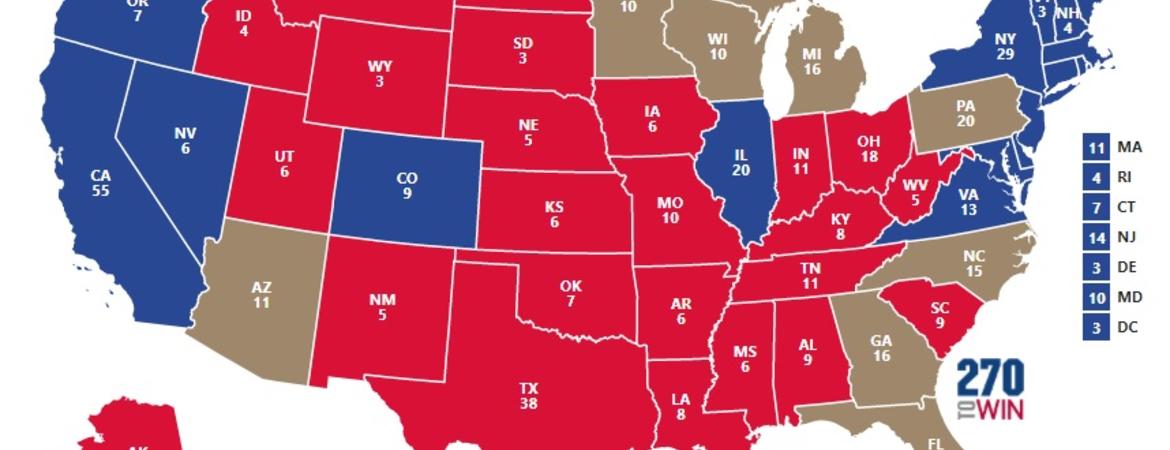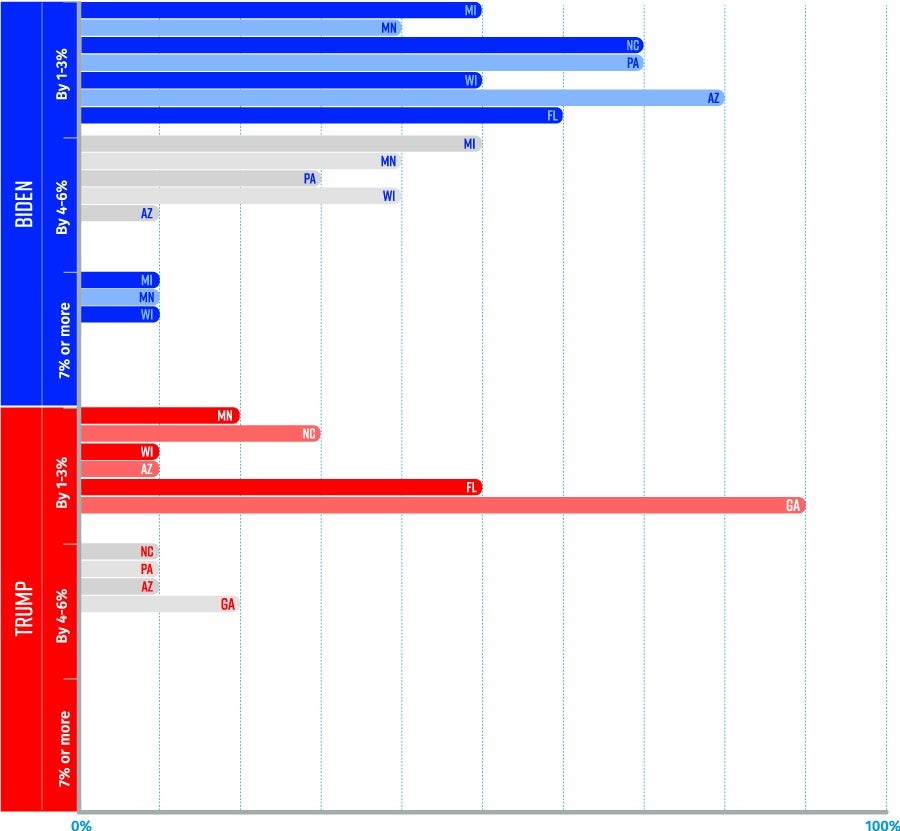
Much of the angst heading into Nov. 3 is thanks to a few hard-to-hold states with a well-earned reputation for being wishy-washy where presidential elections are concerned.
UC Riverside political science professors were polled on their predictions for eight battleground states, and the results carry some optimism for the Joe Biden camp, while also suggesting they should forget about Georgia.
The political scientists unanimously predicted Biden will win Michigan, with six of 11 who voted in the poll saying the former vice president will win by more than 4 percentage points. All 11 were also unanimous in saying that Donald Trump will win Georgia.
Ten of 11 said Biden will win Pennsylvania and Wisconsin. That’s significant in that most political prognosticators say it will be difficult for either candidate to win if he loses Pennsylvania and its 20 electoral votes.
UCR political scientist Francisco Pedraza pointed to the apparent success of Democrats in registering new voters in those battleground states.
“My view on Michigan and Pennsylvania is driven by the early voter turnout figures and on-the-ground mobilization campaigns in each state,” said Pedraza, who predicted Biden wins.
Political scientist Karthick Ramakrishnan said Black voter turnout will be key to winning in those states.
“We are accustomed to thinking of white working-class voters as critical to winning these so-called ‘Rust Belt’ states, but we should remember that President Obama’s victories in the Midwest and mid-Atlantic depended on high Black turnout,” he said, adding Obama was also the benefactor of support from Asian American and Latino voters.
“If Biden wins Michigan and Pennsylvania, it would signal a very strong return of the ‘Obama coalition,’ with communities of color playing a central role in those states,” Ramakrishnan added.
Nine of 11 in the poll said Biden will win Minnesota and Arizona.
UCR’s political scientists were most in disagreement over Florida and North Carolina. Of the 11 respondents, six had Biden winning Florida by 1%-3%; five predicted Trump winning by 1%-3%. In North Carolina, seven of 11 political scientists predicted a slim Biden win; four predicted a Trump win, by as much as 4%-6%.
Of Florida, political scientist and Graduate School Dean Shaun Bowler suggested a "pro-conservative lean and a history of voter suppression" should temper optimism in the Biden camp.
Of course, as two presidential elections in recent memory have attested, the popular vote doesn’t ensure winning the necessary 270 electoral votes.
If the professors’ analysis holds true, Biden would win the election with 334 electoral votes to Trump’s 204 — similar to the wide margin Barack Obama won over Mitt Romney in 2012, 332-206, but well short of a blowout on the scale Ronald Reagan enjoyed over Walter Mondale in 1984 — 525 to 13.
That Biden margin assumes much that isn’t addressed by the poll; chiefly, that solid blue states remain blue and “just barely blue” states go blue.
If Biden loses Florida and North Carolina, it’s a much closer race, with Biden claiming 290 electoral votes to Trump’s 248. That assumes Trump holds onto traditional GOP strongholds including Texas – which some pundits believe may flip.
The polling site FiveThirtyEight — named after the number of votes in the electoral college — has become a go-to during this election cycle. Its methodology seeks to elevate polling to a science. FiveThirtyEight factors numerous national polls, assigning varying weights based on sample size and performance in past elections. It also finagles an impressive degree of nuance into its formula, including an economic index that dates to 1880 and how states’ respective COVID-19 death tallies may affect voting.
FiveThirtyEight’s most recent conglomeration of polls shows little movement from the past several months. On Oct. 28, FiveThirtyEight had Biden ahead in the popular vote by 51.8% to Trump’s 42.9%, with Biden winning in the Electoral College by 342.8-195.2.
A recent poll from Investor’s Business Daily, which is assigned an A rating for its methodology, has Biden up by 5 percentage points, 50% to 45%. CNBC, also assigned an A rating, has Biden winning 51%-40%. Another reputable poll, however — from Emerson College in Boston — shows a slimmer margin for Biden, 51%-47%.
But why should voters listen to polls? Every major analysis in 2016 had Hillary Clinton winning the electoral vote, most by a margin similar to what Biden is predicted to claim.
The answer lies in the oft-ignored margin of error, Bowler said.
“Good polls always report a margin of error; they are pretty explicit about how wrong they may be,” Bowler said. “But polls are not always talked about that way; news outlets tend to want to focus on the actual number or point estimate.”
This is where Biden supporters may find some reassurance. Biden’s margins are higher than Clinton’s in states such as Michigan and Wisconsin, meaning he could withstand a variance of 5 percentage points, which Clinton — predicted to win those states — could not.
Bowler said anecdotal observation supports a Biden win, as well.
“Trump won 2016 by a hair’s breadth,” Bowler said. “At minimum, he needed to keep his coalition together; a better plan would have been to expand that base. Arguably, he has had a hard time holding onto his voters from last time.”
Also in contrast to 2016, political scientist Kevin Esterling said: “There are very few undecided voters at this time.”
For utilities that allow voters to explore different election outcomes, visit https://www.270towin.com/ or https://www.nytimes.com/interactive/2020/us/elections/election-states-biden-trump.html.




